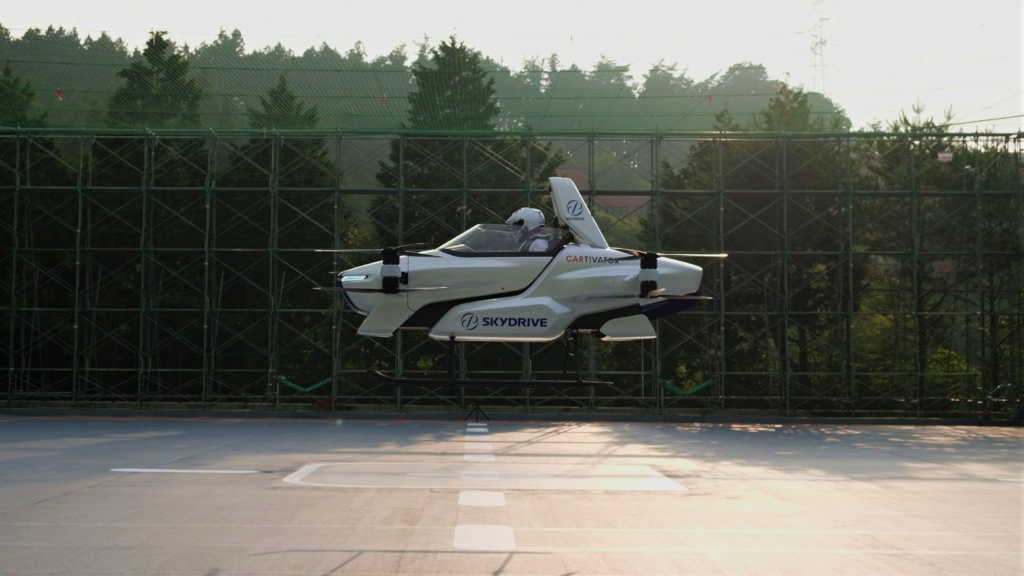TOKYO, JAPAN — SkyDrive Inc. (headquartered in Shinjuku Ward, Tokyo; Tomohiro FUKUZAWA, CEO), an advanced air mobility solutions employing flying cars1 and cargo drones, is pleased to announce that the company’s application for a type certificate2 for its flying car was accepted by the Ministry of Land, Infrastructure, Transport, and Tourism (MLIT) on October 29, 2021. As such, the company has now initiated a type certification project for the aircraft that it aims to commercialize in 2025. SkyDrive is the first flying car developer to reach this stage in Japan.
What Is a Type Certificate?
Under Japan’s Civil Aeronautics Law, MLIT issues a type certificate to certify that the design, structure, strength, and performance of a newly developed aircraft meet the necessary safety and environmental requirements for each type of aircraft. Certification is only granted after the aircraft had gone through a battery of studies and tests, including strength tests and flight tests. This is the first time that MLIT has accepted an application for a type certificate for a flying car.
Comment by Tomohiro FUKUZAWA, Chief Executive Officer, SkyDrive Inc.:
SkyDrive and MLIT have been discussing how to safely develop and test this type of aircraft since the Public-Private Council to promote urban air mobility was launched in Japan in 2018 and SkyDrive received permission for the first outdoor test flight of its flying car. We are very pleased that our application for type certification has been accepted and we will continue to work in close partnership with the government and MLIT to complete our development of a wholly safe and reliable flying car.
We would like to express our heartfelt gratitude to all of those who have supported us in various ways up to this point and we will continue striving to launch a viable flying car business with the assistance of various organizations and companies, including MLIT, in pursuit of our common goal of realizing an air mobility society.
About SkyDrive Inc.
SkyDrive was established in July 2018 with the mission of “Leading a once-in-a-century mobility revolution.” Since then it has been furthering its development of flying cars and cargo drones and working in partnership with others to promote the shared vision of a future world where people can use air mobility as a means of transportation in their daily lives. In the development of flying cars, SkyDrive is the only company in Japan that has successfully conducted manned test flights and it is involved in designing the future system of an air mobility society as a member of Japan’s Public-Private Council for advanced air mobility. The company’s cargo drones, which can carry payloads of more than 30kg, are already being used at worksites in Japan, mainly in mountainous areas. SkyDrive is aiming to launch a flying car service in the Osaka Bay area in 2025. To learn more, visit: https://en.skydrive2020.com/

The SD-03, a single-seat experimental aircraft,
in a successful manned flight demonstration in August 2020
Editor’s Notes:
- There is no universally employed definition of a flying car, but these aircraft are characterized by electrification, a fully autonomous autopilot, and vertical takeoff and landing. In some countries, they are termed “electric vertical takeoff and landing (eVTOL)” aircraft and the concept of urban air mobility (UAM) is now widely accepted, with many countries around the world working on the development of such aircraft as a new mobility solution, as described in MLIT Material 5 (https://www.mlit.go.jp/common/001400794.pdf).
In Japan, the Public-Private Committee for the Air Mobility Revolution was set up in 2018 and many meetings have been held since then and a variety of initiatives have been launched. The project is expected to lead to taxi services in urban areas, new means of transportation for remote islands and mountainous areas, and emergency transportation in times of disaster. A roadmap has been formulated by MLIT and the Ministry of Economy, Trade, and Industry (METI) for the start of business in 2023 and full-scale deployment in 2030. - A type certificate certifies that the design of an aircraft type complies with the relevant safety and environmental requirements.

